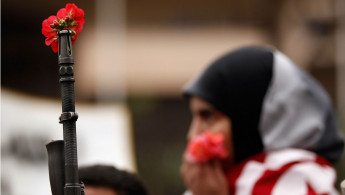Tunisia after 2011: The three lies that came undone
It is the anniversary of the departure of former dictator Zine El Abidine Ben Ali from Tunisia in the face of its revolution, and four years later this historic event is still being debated by Tunisians. Was it a real revolution or a coup by stealth; a spontaneous uprising or a dream that has since been shattered?
The debate is likely to continue for many years and will perhaps only be resolved by the historians of the future, who will try to comprehend how the country transformed itself after 14 January 2011.
| People often forget that they themselves make history. |
But until this matter is resolved, the only thing that can be agreed on by all is that Tunisia has changed radically since the days of the old regime.
If there is any useful discussion to be held today, it should debate to what extend Tunisia changed on that day, and how Tunisia's experiences compared with other states that were drawn into the Arab Spring.
People often forget that they themselves make history. So we see people failing to value their achievements, downplaying them, questioning them, and even turning against them. Their recollections of the past may betray them in some cases, and the difficulties of the present might overwhelm them, so that they quickly forget that such a profound transformation of the country will always need time to reach a conclusion, as in all other places and in all other eras.
When this is forgotten, some begin to feel nostalgic about the old executioner. They view his departure with regret even though he took away their freedom, dignity and equality, and replaced it with a sense of false stability and the inequitable distribution of wealth.
An important sign of the changes that have taken place in Tunisia are best exemplified by three lies that have unravelled in the country. Lies that once dominated Tunisia's political culture and were accepted by a large number of Tunisians.
The instability lie
The first of these lies was the claim that the Tunisian people, like all Arabs, were not yet ready for democracy.
It said that multi-party politics would lead to social fragmentation, strife and tribal and regional divisions. It was claimed that the Tunisians needed a strongman to lead them to safety, like a godfather whose sins and mistakes could be forgiven in return for his role as guarantor of unity and a modicum of stability and progress.
The events that have taken place since 14 January 2011 have proved otherwise. Four years on, the Tunisian people have not become fragmented. Chaos has not prevailed. And in the absence of "one leader", Tunisia has not become a banquet for local and foreign fat cats to dig their teeth into.
The people protected their interests from the first days after Ben Ali's flight left a power vacuum, and in an impressive manner that reflects their tolerance and patriotism.
The vacuum was filled constitutionally. Tunisians accepted, temporarily, a government that ensured the continuity of the state, followed by an unexpected government led by a figure who was something of a blast from the past.
An expanded body was formed next, in order to succeed the previous dissolved parliament. This served as an incubator for new political and civil society forces. Elections were held, showing rare social maturity among Tunisians, even though they had no democratic precedents to fall back on.
| Read our special anniversary coverage on Ben Ali's departure from Tunisia here |
A first-of-its-kind coalition government was put together, and while it collapsed soon afterwards, it handed over power without a struggle, despite the fact that it could have clung on for much longer.
Tunisians agreed, almost unanimously, to a new constitution that the whole world welcomed, and recently, legislative and presidential elections were held under international observation. They were unprecedented in the entire Arab region.
Do these experiences not prove that the Tunisian people had long been ready for democracy, and that the real problem was that their rulers were not mature enough to exercise democracy?
The extremists lie
The lie that was particularly championed by agents of the old regime went along the lines that, in the absence of a strong state led by a "strongman", the Islamists - being the most organised force in the country - would grab the opportunity to take over the state.
Islamists would sabotage the achievements of the regime and establish an obscurantist, authoritarian, religious state.
This fear-mongering was a strategy used by remnants of the old regime to monopolise power and prolong the life of the dictatorship.
When the regime was overthrown, those who predicted that the political vacuum would favour the Islamists were right.
But the Islamists did not pounce on state institutions and dismantle them. Instead, they accepted the rules of the democratic game, agreed to consult the ballot boxes and won a majority in the constituent national assembly. But they rushed to assume power before they had a suitable political programme and made some terrible mistakes.
| [Islamists] accepted the rules of the democratic game, agreed to consult the ballot boxes and won a majority. |
Because the Islamists failed to govern the country well, opposition to them grew. It prompted the Ennahdha movement to seek national dialogue and consultation with the people, but this all happened peacefully.
Even when the Tunisians punished the Islamists at the polls, they accepted the will of the people and the political equation in the country soon changed. Democracy succeeded, and the Tunisians did not find themselves having to battle with a bloodthirsty movement trying to hold on to power at any cost.
Tunisians tamed a segment of the Islamist movement. The special Tunisian character triumphed over the globalised brand of Islamist ideology that is still trying to infiltrate the country through Salafism and Jihadism, but both have failed to find fertile ground in Tunisia
The lie about the West
The third lie of the old guard, later disproved by the revolution, was that the West would not allow democracy to flourish or become entrenched in Tunisia.
But the transition in Tunisia has shown that the West does not have a singular strategy with the country, and that the West's own interests remain more important to its thinking than either its wider principles or its narrow and immediate calculations.
Indeed, there is no proof that the West is trying to hinder democratic transition in Tunisia. On the contrary, the transition in Tunisia has enjoyed concrete support from major western states. Tunisia has even become a role-model for a viable Arab democracy.
In summary, evaluating what happened in Tunisia four years later requires an objective and comprehensive overview.
What happened might not have been a revolution at all, it may be an incomplete and open-ended revolution, or it may be an uprising that merely shook off the old regime. But what happened during this period is nothing to scoff at.
Setting up a system with a peaceful rotation of power is a major historical milestone, so let us not downplay this achievement on the anniversary of the revolution. Let us focus on a future for Tunisia which emphasises development, social justice and boosting local democracy.
This article is an edited translation from our Arabic edition.

![Palestinians mourned the victims of an Israeli strike on Deir al-Balah [Getty]](/sites/default/files/styles/image_684x385/public/2024-11/GettyImages-2182362043.jpg?h=199d8c1f&itok=xSHZFbmc)


![The law could be enforced against teachers without prior notice [Getty]](/sites/default/files/styles/image_684x385/public/2178740715.jpeg?h=a5f2f23a&itok=hnqrCS4x)
 Follow the Middle East's top stories in English at The New Arab on Google News
Follow the Middle East's top stories in English at The New Arab on Google News


